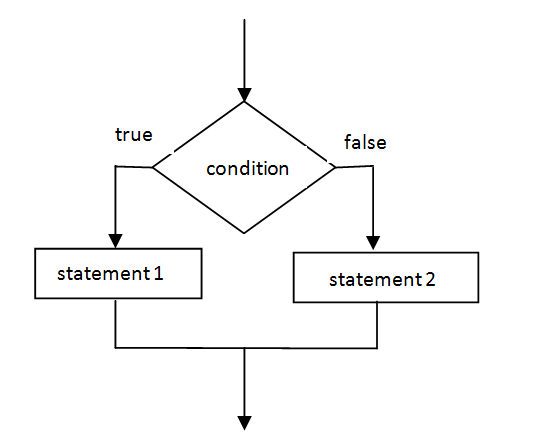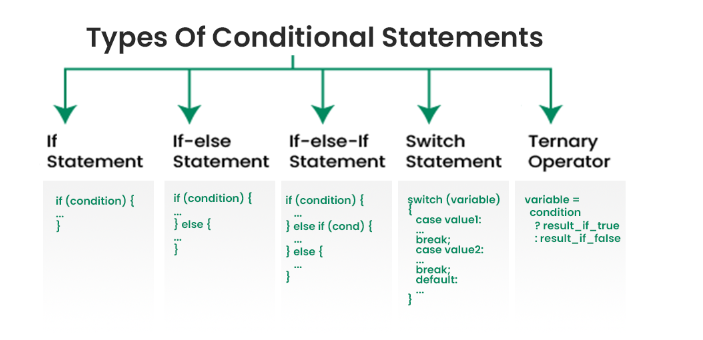What is necessity of going for c conditional statements:
-making decisions
Example:
suppose I want to perform the sum of addition of given number starting from 1
we will be checking the conditions whether the entered number is greater than 1
Example1 :
#include<stdio.h>
int main()
{
int sum=0;
printf(“enter the number “);
scanf(“%d”,&num);
if(num>1 &&num<100) // here we are making decision by using the condition
{
for(int i=0;i<num;i++)
{
sum+=num;
}
}
Example 2:
#include <stdio.h>
#include <ctype.h>
int main() {
char ch = ‘5’;
if (isdigit(ch)) # here the decision making is used
{
printf(“‘%c’ is a digit.\n”, ch);
} else {
printf(“‘%c’ is not a digit.\n”, ch);
}
return 0;
}
Example 3:
#include <stdio.h>
#include <ctype.h>
int main() {
char str[100];
int i = 0, is_alphanumeric = 1;
// Get user input
printf(“Enter a string: “);
fgets(str, sizeof(str), stdin);
// Check if the string is alphanumeric
while (str[i] != ‘\0’ && str[i] != ‘\n’) {
if (!isalnum(str[i])) {
is_alphanumeric = 0;
break;
}
i++;
}
if (is_alphanumeric) {
printf(“The string is alphanumeric.\n”);
} else {
printf(“The string is not alphanumeric.\n”);
}
return 0;
}
Applications of If-Else Conditional Statement:
- Error Handling: For instance, showing an error message when the user provides invalid input.
- Program Flow Control: Managing the flow of the program by directing execution based on specific conditions.
Advantages of If-Else Conditional Statement:
- Effectively handles binary decisions.
- Simple and straightforward syntax.
Disadvantages of If-Else Conditional Statement:
- Limited to handling only binary decisions.
- Can become cumbersome and hard to manage in complex situations
Flow chart of


Types of conditional statements
If else statements:
The if…else statement in C is a basic control flow statement used to execute a block of code based on whether a specified condition is true or false. It helps in making decisions in the code, allowing it to branch into different paths.
Structure of if…else
if (condition) {
// Code to execute if condition is true
} else {
// Code to execute if condition is false
}
Explanation:
- if block: The if block is executed if the specified condition is true.
- else block: If the condition is false, the program skips the if block and instead executes the else block.
Example of if…else
#include <stdio.h>
int main() {
int age;
printf(“Enter your age: “);
scanf(“%d”, &age);
if (age >= 18) {
printf(“You are eligible to vote.\n”);
} else {
printf(“You are not eligible to vote.\n”);
}
return 0;
}
Example 2:
#include <stdio.h>
#include <ctype.h>
int main() {
char ch = ‘5’;
if (isdigit(ch)) # here the decision making is used
{
printf(“‘%c’ is a digit.\n”, ch);
} else {
printf(“‘%c’ is not a digit.\n”, ch);
}
return 0;
}
}
If else-if statements:
The if…else if statement in C (and many other programming languages) allows you to create branching logic where different conditions can lead to different outcomes. This structure is useful when you need to check multiple conditions and take different actions based on which condition is true.
Basic Structure of if…else if…else
if (condition1) {
// Code to execute if condition1 is true
} else if (condition2) {
// Code to execute if condition2 is true
} else if (condition3) {
// Code to execute if condition3 is true
} else {
// Code to execute if none of the above conditions are true
}
Explanation:
- if block: The if block is checked first. If condition1 is true, the code inside this block executes, and the rest of the else if and else blocks are skipped.
- else if blocks: If condition1 is false, the program checks condition2. If condition2 is true, the code inside this else if block executes. You can have as many else if blocks as needed.
- else block: If none of the conditions are true, the code in the else block executes as a “default” option.
Example of if…else if…else
#include <stdio.h>
int main() {
int tot;
printf(“Enter your tot: “);
scanf(“%d”, &tot);
if (tot >= 90) {
printf(“Grade: A\n”);
} else if (tot >= 80) {
printf(“Grade: B\n”);
} else if (tot >= 70) {
printf(“Grade: C\n”);
} else if (tot >= 60) {
printf(“Grade: D\n”);
} else {
printf(“Grade: F\n”);
}
return 0;
}
Switch:
It’s useful when you have multiple conditions to check based on a single value. Here’s the basic syntax:
switch (expression) {
case constant1:
break;
case constant2:
break;
default:
break;
}
Key Points
- In a switch statement, the expression must evaluate to an integer or a character.
- Each case keyword is followed by a constant value (integer or character) and a colon :.
- If the expression’s value matches this constant, then respective case will execute.
- The break statement exits the switch block; without it, execution will “fall through” to the next case.
Example: Simple Calculator Using switch
#include <stdio.h>
int main() {
char operator;
int num1, num2;
printf(“Enter an operator “);
scanf(” %c”, &operator);
printf(“Enter two numbers: “);
scanf(“%d %d”, &num1, &num2);
switch (operator) {
case ‘+’:
printf(“%d”num1 + num2);
break;
case ‘-‘:
printf(“%d” num1 – num2);
break;
case ‘*’:
printf(“%d “ num1 * num2);
break;
case ‘/’:
if (num2 != 0)
printf(“%d”, num1 / num2);
else
printf(“Division by zero error!\n”);
break;
default:
printf(“Invalid operator!\n”);
}
return 0;
}
Ternary operator
The ternary operator, also known as the conditional operator, is a shorthand way to perform conditional checks in programming languages like C, C++, Java, and Python. It is a compact alternative to an if-else statement
Syntax
condition ? expression_if_true : expression_if_false;
- condition:expression evaluates to either true or false
- expression_if_true: Executed if the condition is true.
- expression_if_false: Executed if the condition is false.
Example
Suppose you want to find the maximum of two numbers using a ternary operator:
int a = 10, b = 20;
int max = (a > b) ? a : b;
printf(“%d”,max);



